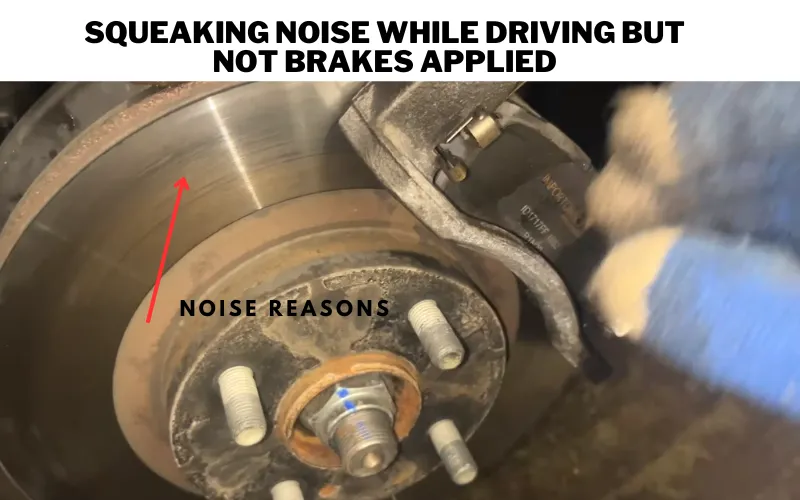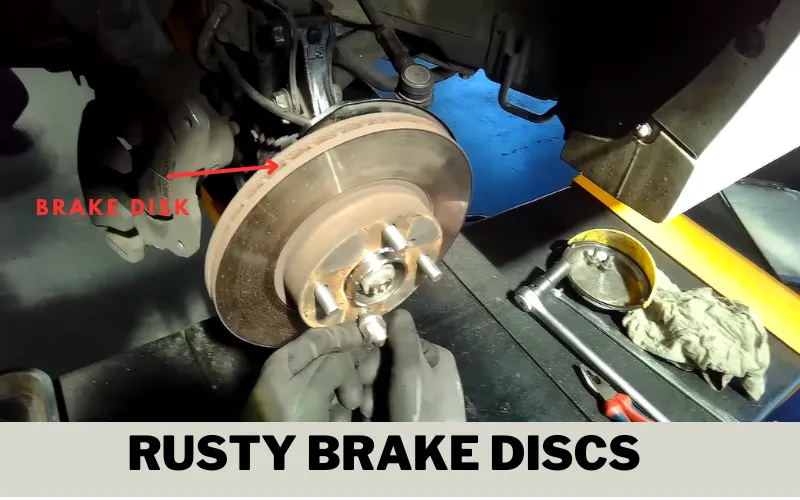Do you hear a squeaking noise when driving but the brakes are not applied?
The squeaking noise is perhaps coming from the brakes.
Sometime, but not always, these squeaking noises are not necessarily
Dangerous.
There are many factors, some of which may or may not be brake
Related, that can cause your car to squeak while you are driving but not braking. The squeaking noise could be caused by a problem with the brake
Pads, callipers, rotors or steering system.
Other possible causes include pollution, bad weather an overheated engine or uneven tread wear.
Accumulated dust may cause a loud noise when looking discs. Another
Possibility is a stuck brake calliper. Other potential vehicle problems include a suspension or steering fluid leak or misalignment.
In this article, we will discuss about some causes of squeaking noise:
Reasons of Squeaking Noise While driving but not Brake Applied
Here are some common causes for squeaking noise:

1) Old Brake Pads
Brake pads to be replaced if they squeak while driving but the brakes don’t work. A brake wear indicator, a metal clip that attaches to the brake pads,
In usually included when you purchase the brake pads. These pads wear down over time and rub against rotors. This causes a squeaking noise when driving.
Although it is safe, never drive for a long period of time without replacing the brake pads. A common way to stop or prevent a car from squeaking is to replace the bake pads with materials that provide better grip.
2) Humidity
When driving without brakes, whistling noises may occur due to high humidity.
Moisture causes rust to from on the rotors, causes the pads to squeak. You should have your wheels cleaned or replaced by a professional.
3) Sticks and Stones
Ceramic is now widely used as a material for brake pads by many automobile manufacturers because it performs well and lasts a long time.
Unfortunately, metal rotors produce a lot of noise. You can use a small knife to make shallow scratches on the ceramic plate. A creaking noise is immediately heard. If your current ceramic discs are very noise ask your technician to install semi-metallic discs.
More Information: My car making Clicking or Popping Noise When Braking
4) Rusty Brake Discs
When it comes to preventing wheelspin, brake discs play a key role. Brake pads are attached to brake rotors, which are discs. Although surface rust does occasionally appear on the rotor, it is not usually a serious problem.

Although this type of rust can be removed, if left untreated it can cause pitting and damage to the rote. Ultimately, this can lead to squeaking noises. To prevent rust, it is recommended to drive your car frequently and protect it from rain by storing it in a garage.
It is also recommended to lightly press the brake serval times after starting the vehicle to dry it.
5) Enameled or Slotted Rotors
Rotors are another common component in vehicles that make squeaking noises when driving with brake. As your brake pads wear down, your car’s rotors and brake discs begin to develop glazing, grooves, or uneven wear.
After replacing your brake pads, have your mechanic remove the brake rotors and inspect them for colour or scoring. Depending on their condition, dials and discs may need to be cleaned or replaced. This ensures that quietest smoothest possible ride.
6) Negligence
If a mechanical problem occurs, your car may scream when driving without brakes. Your car may still make this grinding noise if, for example, the auto repair shop did not lubricate the brake axles or spray anti-seize on the brake pads after replacing the brake discs.
Ask your mechanic to lubricate and replace the anti-rattle brackets or pins to reduce brake pad noise! We encountered a number of brake problems, such as worn brake pads or a brake light that wouldn’t turn off. All of these warning signs require special attention.
If you can’t do if yourself, it’s best to entrust it to a qualified professional!
7) Transmission Noise
In general, there should be no grinding noises from the gearbox. However, some of the noises it makes can be confused with squeaking.
For example, if the transmission fluid level is low. You may experience a squeaking noise, which is often mistaken for a squeaking noise. In any case, it is important not to ignore the broadcast noise.
8) Engine Noise
It is possible that the noise has nothing to do with the braking system. You may actually hear noises coming from the engine area, which can occur when the belt begins to slip or an internal fault occurs.
In these cases, it is advisable not to drive until the problem, such as a stuck stone, has been identified.
Is it Dangerous to Drive a Car with Squeaking Noise but Brake are Not Applied?
No, driving a car with squeaky brakes is not dangerous. The reason for this is so that your car’s barking system does not become unusable and you can still control the car quite precisely.
However, the high-pitched sound can be very irritating to the ears. The risk of driving with a damage barking system cannot be ignored either. It could be that your car’s brakes are simply overheating or that dust is the causes of the problem.
In this case, leave the car for a while or clean the brake system yourself. However, if your car is squeaking due to a complex problem, have your brakes checked by a qualified mechanic who knows what the problem is.
In this worst case, the brake pad can sag significantly and the pad can wear down to the steel pad. As a result, rotors can fail completely, turning a cheap pad replacement into a more expensive repair.
Keep in mind that rotors are not cheap and you may have to spend up to $300 per rotor per axel. The sooner you repair the brake, the better.